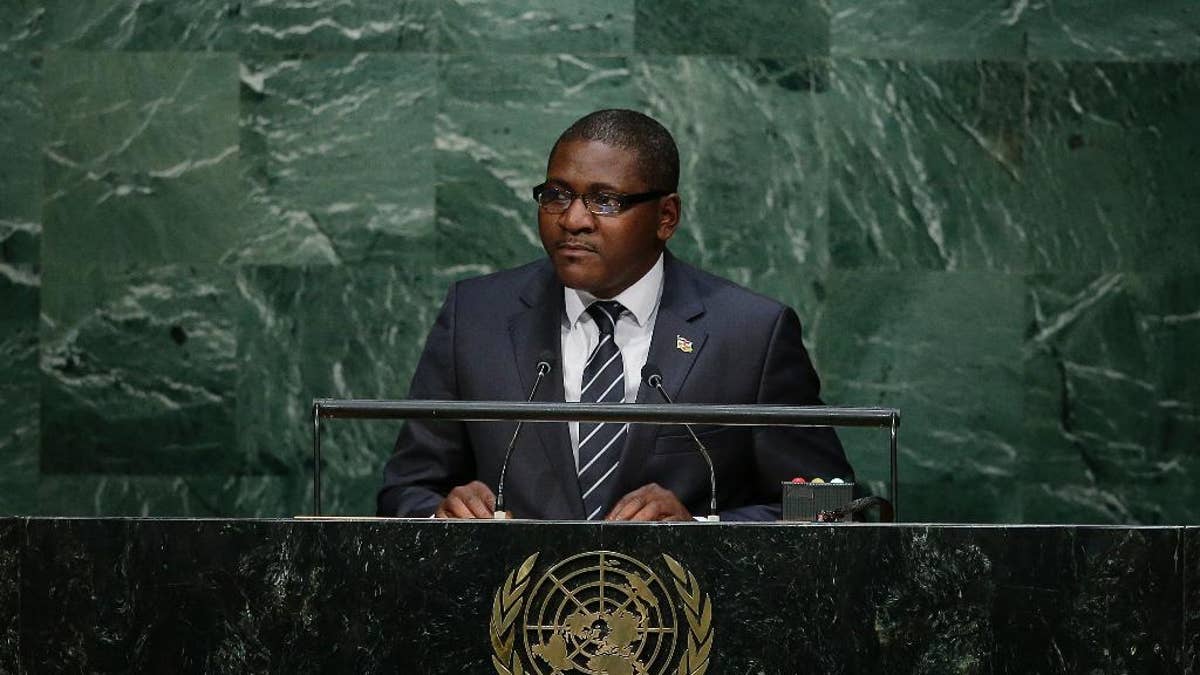
Foreign Minister for the Central African Republic, Samuel Rangba speaks during the 70th session of the United Nations General Assembly at U.N. headquarters Wednesday, Sept. 30, 2015. (AP Photo/Frank Franklin II) (The Associated Press)
UNITED NATIONS – Fresh violence in Central African Republic has forced the delay of Oct. 18 elections meant to put the troubled country on firmer political ground, officials said Thursday, but they hope the vote will take place by the end of this year.
A transitional government is charged with leading the country to elections after months of upheaval, but deadly fighting between rival Christian and Muslim militias erupted again Saturday. Its foreign minister and the U.N. peacekeeping chief announced the delay to reporters after a high-level U.N. meeting on the crisis.
President Catherine Samba-Panza this week rushed home from the U.N. General Assembly of world leaders as the death toll in the capital, Bangui, rose into the dozens and aid officials said it was too dangerous to help the wounded and recover bodies.
The U.N. humanitarian agency on Thursday said the number of people displaced by the new fighting has now exceeded 40,000 in Bangui alone.
"We cannot go backwards," Foreign Minister Samuel Rangba told reporters. He repeated the plea he made late Wednesday in a speech to the nearly empty U.N. General Assembly chamber, saying the U.N. must lift an arms embargo to allow his government to import weapons to keep order.
"You can't support a country without the military and public force necessary to establish the authority of the state," Rangba said. He said government officials would be talking with the U.N. sanctions committee for his country in the coming days.
He also called for a stronger mandate for the U.N. peacekeeping force in Central African Republic, which was established last year as the unprecedented sectarian violence killed untold thousands of civilians.
Peacekeeping chief Herve Ladsous called the political transition "imminent" but acknowledged that the Oct. 18 date for elections is "not feasible."
Rangba called the new violence a "putsch" and blamed supporters of two former leaders, Michel Djotodia and Francois Bozize, for causing it. U.N. chief Ban Ki-moon told Thursday's meeting that the latest fighting was "designed to destabilize the country."
Rangba called the situation in Bangui quiet Thursday as U.N. and French troops helped to maintain order in the capital.
The foreign minister promised the elections, once they can be held, will be inclusive. He said the government was working on arrangements with countries sheltering refugees from his country so that they would be able to participate in the vote. Tens of thousands of Muslims fled the country.
Economic minister Florence Limbio officials still need to complete the electoral lists and distribute ballots.
Limbio did not give specific details on any aid pledges made by countries during Thursday's closed-door meeting.
At least 42 deaths have been confirmed in Bangui since Saturday. However, the head of the national Red Cross said that death toll is far from complete as its workers have not been able to get into some of the hardest-hit neighborhoods.






































